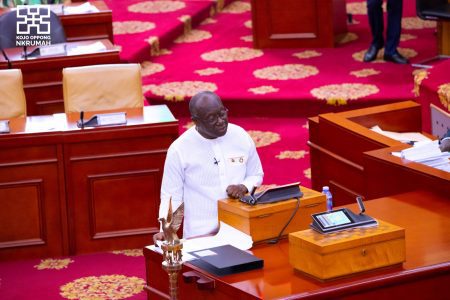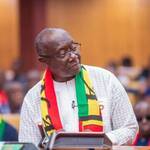Overall Real Gross Domestic Product (GDP) growth projections for the year 2023 has been revised by almost half from 2.8% to 1.5%.
Non-Oil Real GDP growth rate has also been cut by half to 1.5% from three per cent.
Finance Minister Mr Ken Ofori-Atta, announced the cuts in Parliament when he presented the Mid-Year Fiscal Policy Review of the 2023 Budget Statement and Economic Policy.
The downward review of the macro-fiscal targets is to reflect a slowdown in the economy which is attributable to difficult global conditions and the implementation of fiscal consolidation plan aligning with International Monetary Fund (IMF) supported Post COVID-19 Programme of Economic Growth (PC-PEG).
Shortfalls in revenues
The Finance Minister pointed out that fiscal developments between January and June 2023 reflect shortfalls in revenues and lower spending.
According to him, end-period headline inflation target has been reviewed to 31.3%, from 18.9%.
He announced a projected rebound to 2.8% in 2024 which will increases to 4.7% in 2025 and 4.9% in 2026.
0.5% deficit of GDP on primary balance
Ofori-Atta also projected 0.5% deficit of GDP compared to a surplus of 0.7% of GDP on primary balance on commitment basis, aligning with IMF-supported PC-PEG target Primary balance.
0.8 months of imports
He also projected a Gross International Reserves sufficient to cover at least 0.8 months of imports of goods and services by 2023.
“We have, however, been charged in the PC-PEG to develop an enhanced Growth Strategy supported by crowding in of private domestic and foreign investments to further boost growth. We are confident of a private sector outlook to boost growth and jobs,” he said.
GH₵51.3bn Compensation of Employees
He said Compensation of Employees has been revised upward to GH₵51,346 million(6.0% of the Revised GDP) from the 2023 Budget target of GH₵45,523 million (5.7% of GDP) largely reflecting the realised 30% Base Pay increase negotiated with Public Sector Workers compared to the 20% used in the 2023 Budget.
GH₵44.8bn interest payments
According to him, interest payments have been revised downwards by 14.6%, amounting to GH₵44,866 million (5.2% of GDP) from GH₵52,550 million (6.6% of Revised GDP), mainly reflecting the outcome of the ongoing completed part of the Domestic Debt Exchange Programme.
Capital Expenditure revised downwards by 23%
The Finance Minister stated that Capital Expenditure has also been revised downwards by 23% to GH₵20,441 million (2.4% of Revised GDP), from the 2023 Budget estimate of GH₵26,546 million (3.3% of GDP).
Of this amount, Foreign-Financed Capital Expenditure has been revised downwards to GH₵9,903 million from GH₵16,009 million to reflect exchange rate development
GH₵30bn grants to other government Units
Ofori-Atta noted that grants to other government Units have been revised upwards from GH₵30,079 million (3.8% of Revised GDP growth) to GH₵30,996 million (3.6% of GDP growth) following the upward revision to non-oil tax revenue as well as the partial restoration of capped transfers to the National Health Insurance Scheme (NHIS) and Ghana Education Trust Fund (GETFund) in line with Government’s objective to protect the vulnerable.
Oil pegged at $74 per barrel
He also indicated that the average crude oil price has been revised to $74 per barrel down from the price of $88.55 per barrel used in the 2023 Budget.
32% decline in oil revenue
Based on performance of crude oil production for the first six months of 2023, a revised production volumes for 2023, and the revised crude oil prices, the total petroleum receipts have been revised downwards from $1,484.47 million to $1,008.65 million representing a 32% decline.
Appropriation revised to GH₵206bn
The GH₵227.7 billion Appropriation, which was approved in the 2023 budget in November 2022, had been revised to GH₵206 billion.
Mr Ofori Atta explained that the drivers of the 2023 Fiscal Framework included the need to align 2023 Mid-Year Review to the approved IMF-supported PC-PEG, shortfalls in revenues and lower spending for the first half of the year.
No supplementary budget required
He explained that improvements in non-oil tax revenues, coupled with a downward review of oil revenue and expenditure rationalisation measures, would support government’s operations without additional budget financing.
“For the first six months of the year, we continue making progress to exceed our non-oil revenue targets for the year. We have seen improvements in non-oil tax revenue collection despite some noticeable shortfalls in Value Added Tax (VAT),” he said.
However, he said the Government would have a downward review of the oil-related revenue with corresponding expenditures to align with the underperformance of some of the country’s revenue handles.
That was to make up for the shortfall in oil revenue expectations due to changes in global prices, which the Minister said would also impact on the Annual Budget Funding Amount (ABFA).
The developments above, together with a lower domestic interest payment and amortisation, part completion of the Domestic Debt Exchange Programme (DDEP), and reduction in foreign financed capital expenditure had led to a review of government’s Appropriation.
In the absence of the supplementary budget, Mr Ofori-Atta said the Government remained “committed to pursuing a robust growth strategy within the limited fiscal space and our fiscal consolidation programme.”
That would be achieved by attracting domestic and foreign private sector investments and expanding production, through encouraging and stimulating government policies and agencies.
“The economy is showing signs of recovery. The exchange rate has stabilised, inflation has softened, and interest rates have declined since December 2022.” Mr Ofori-Atta said.
He attributed the recovery to the implementation of measures in the 2023 budget and positive sentiments arising from the progress of the International Monetary Fund (IMF) $3bn loan support programme.
He expressed appreciation to the Speaker and Members of Parliament, participating bondholders, retirees, financial institutions and other stakeholders, who the Minister said played critical roles in “Ghana’s successful journey towards the IMF-Supported Programme.”
- Friday, May 9, 2025 Newspaper Headlines - 9 May 2025
- Adangabey brightens rural kids’ future from his wheelchair - 9 May 2025
- Stanbic donates ICT equipment to UHAS for digital learning - 9 May 2025

